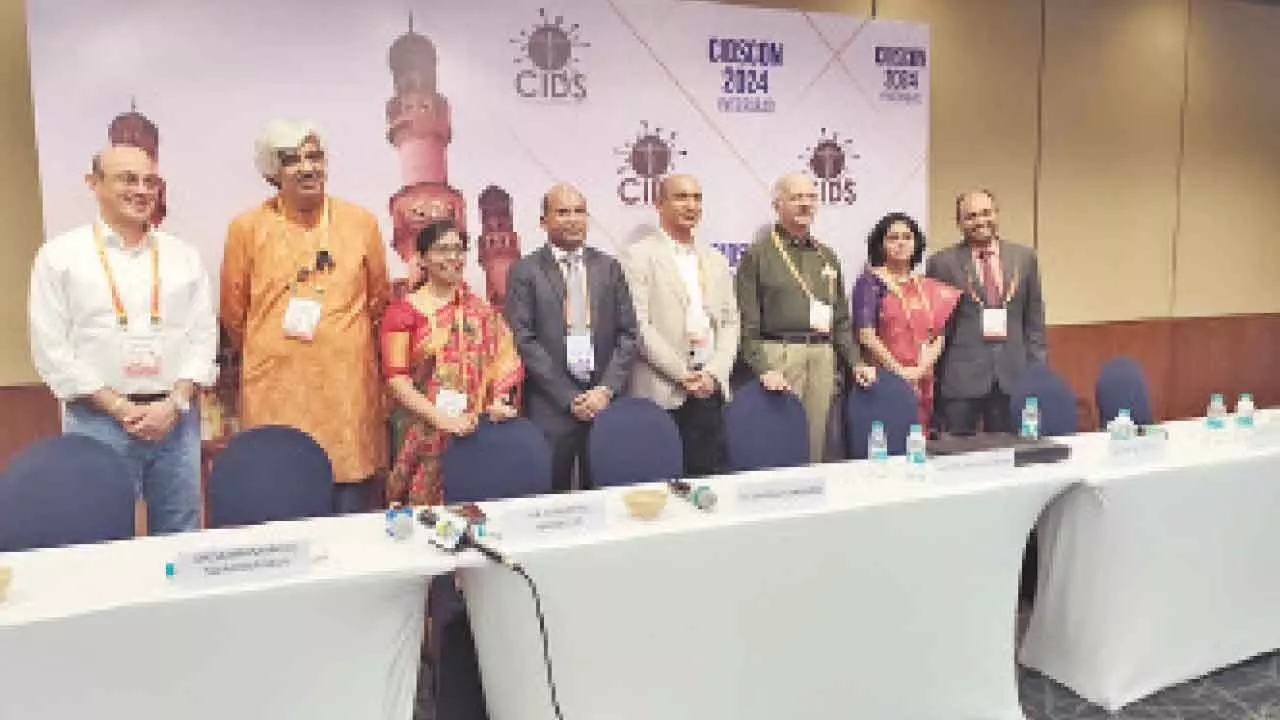Live
- All you need to know about PAN 2.0
- Akasa Air redefines travel experience with industry-first offerings
- MP: Residents stage protests against liquor shop in Indore
- Telugu Actor Shri Tej Booked for Alleged Cheating and False Promise of Marriage in Live-in Relationship
- Toyota Kirloskar Motor Celebrates 1 Lakh Urban Cruiser Hyryder on Indian Road
- MLS: New York City FC part ways with head coach Nick Cushing
- Delhi CM says Centre cutting AAP voters’ names from rolls, BJP hits back
- Hyderabad Metro Rail Phase-II Works to Begin in Old City in January 2025
- Odisha: 668 persons killed in human-elephant conflicts in last three years
- DEFENDER JOURNEYS: TO EMBARK ON ITS THIRD EDITION FROM NOVEMBER 2024
Just In
CIDS meet on anti-microbial resistance kicks off at HICC


- Focus: Infectious disease management advancements and challenges in India
- India faces one million AMR-related deaths annually, globally five million
- AMR could cause ten million deaths yearly by 2050
- Misuse of antibiotics fuels AMR
- CIDS promotes antimicrobial stewardship to optimise their use in healthcare
- Highlights need for enhanced infection control, hand hygiene, and vaccinations
- Advocates public education on antibiotic misuse and treatment adherence
- Urges more funding, collaboration, and improved AMR surveillance networks
Hyderabad: The Clinical Infectious Diseases Society’s (CIDS) 14th annual conference, CIDSCON 2024, started on Friday at the Hyderabad International Convention Centre. The conference serves as a dynamic platform for fostering discussions on the latest advancements and challenges in infectious disease management, with a focus on the country.
The conference addresses two critical challenges threatening public health in India: Antimicrobial Resistance (AMR) and emerging infections.
‘Antimicrobial Resistance: A Silent Pandemic’ AMR continues to be a silent pandemic with alarming consequences, particularly in India, which bears one of the highest burdens of drug-resistant infections (DRIs) worldwide. Currently, about one million AMR-associated deaths occur in India, contributing to an estimated five million deaths globally each year. Projections indicate that by 2050, AMR could result in ten million deaths annually, surpassing cancer-associated deaths.
The rise of AMR, driven by the misuse and overuse of antibiotics, was rendering many medical advances ineffective. In India, Gram-negative bacteria such as Klebsiella species, Escherichia coli, and Acinetobacter species are the primary culprits.
Gut organisms like E coli and Klebsiella harbour a common resistance mechanism called Extended Spectrum Beta-lactamases (ESBL) in 70-80 per cent cases, with rapidly spreading carbapenem resistance leading to mortality rates as high as 40 per cent.
The CIDS has promoted actionable efforts to tackle AMR, which include promoting and helping implement antimicrobial stewardship programmes in healthcare facilities across India. These programmes aim to optimise the use of antibiotics, ensuring they are used only when necessary and appropriate. Research to develop diagnostics and new antibiotics is urgently needed.
CIDS calls for increased funding and collaboration between the public and private sectors to drive innovation in this field. Enhanced surveillance of AMR patterns is essential. CIDS advocates the development of an AMR surveillance network to supplement and strengthen national surveillance, enabling timely data sharing and informed decision-making.
Strengthening IPC measures in hospitals and communities is crucial. This includes hand hygiene, sterilisation protocols, and vaccination programmes to prevent infections and reduce antibiotic use. Educating the public about the dangers of antibiotic misuse and the importance of adhering to prescribed treatments is vital. CIDS continues to improve public awareness to address this issue.

© 2024 Hyderabad Media House Limited/The Hans India. All rights reserved. Powered by hocalwire.com






